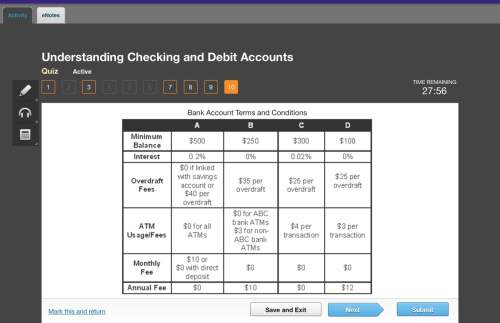
Business, 06.05.2020 23:16 taniyahbenyamin2
A company purchased land for $92,000 cash. Commissions of $13,000, property taxes of $13,500, and title insurance of $4,200 were also incurred. The $13,500 in property taxes includes $7,400 in back taxes paid by the company on behalf of the seller and $6,100 due for the current year after the purchase date. For what amount should the company record the land? a. $112,400. b. $116,600. c. $122,700. d. $92,000.

Answers: 1


Another question on Business

Business, 22.06.2019 06:40
Burke enterprises is considering a machine costing $30 billion that will result in initial after-tax cash savings of $3.7 billion at the end of the first year, and these savings will grow at a rate of 2 percent per year for 11 years. after 11 years, the company can sell the parts for $5 billion. burke has a target debt/equity ratio of 1.2, a beta of 1.79. you estimate that the return on the market is 7.5% and t-bills are currently yielding 2.5%. burke has two issuances of bonds outstanding. the first has 200,000 bonds trading at 98% of par, with coupons of 5%, face of $1000, and maturity of 5 years. the second has 500,000 bonds trading at par, with coupons of 7.5%, face of $1000, and maturity of 12 years. kate, the ceo, usually applies an adjustment factor to the discount rate of +2 for such highly innovative projects. should the company take on the project?
Answers: 1

Business, 22.06.2019 07:50
In december of 2004, the company you own entered into a 20-year contract with a grain supplier for daily deliveries of grain to its hot dog bun manufacturing facility. the contract called for "10,000 pounds of grain" to be delivered to the facility at the price of $100,000 per day. until february 2017, the supplier provided processed grain which could easily be used in your manufacturing process. however, no longer wanting to absorb the cost of having the grain processed, the supplier began delivering whole grain. the supplier is arguing that the contract does not specify the type of grain that would be supplied and that it has not breached the contract. your company is arguing that the supplier has an onsite processing plant and processed grain was implicit to the terms of the contract. over the remaining term of the contract, reshipping and having the grain processed would cost your company approximately $10,000,000, opposed to a cost of around $1,000,000 to the supplier. after speaking with in-house counsel, it was estimated that litigation would cost the company several million dollars and last for years. weighing the costs of litigation, along with possible ambiguity in the contract, what are three options you could take to resolve the dispute? which would be the best option for your business and why?
Answers: 2

Business, 22.06.2019 08:20
How much does a neurosurgeon can make most in canada? give me answer in candian dollar
Answers: 1

Business, 22.06.2019 19:10
Ancho corp. is an automobile company whose core competency lies in manufacturing petrol- and diesel- based cars. the company realizes that more of its potential customers are switching to electric cars. the r& d department of the company acquires competencies in developing electric cars and launches its first hybrid car, which uses both gas and electricity. in this scenario, ancho is primarilya. leveraging new core competencies to improve current market position. b. redeploying existing core competencies to compete in future markets. c. unlearning existing core competencies to create and compete in markets of the future. d. building new core competencies to protect and extend current market position
Answers: 3
You know the right answer?
A company purchased land for $92,000 cash. Commissions of $13,000, property taxes of $13,500, and ti...
Questions






Mathematics, 11.06.2021 19:30



Social Studies, 11.06.2021 19:30


Mathematics, 11.06.2021 19:30

English, 11.06.2021 19:30



English, 11.06.2021 19:30








